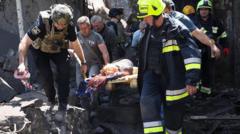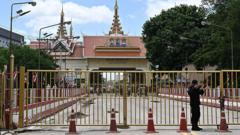Tensions in the Middle East escalate as Iran spins the narrative of recent hostilities to project strength despite severe losses.
**Iran Declares Victory Amid Fragile Cease-Fire with Israel**

**Iran Declares Victory Amid Fragile Cease-Fire with Israel**
In a dramatic turn of events, Iran announces a truce with Israel, claiming military success following significant airstrikes.
June 24, 2025, marked a critical juncture in the ongoing conflict between Israel and Iran, as Iranian officials announced a cease-fire, branding it a military victory over Israel. Following a grueling 12-day conflict that began with Israeli airstrikes targeting key Iranian military installations, Iran's state media proclaimed that these aggressive actions had forced Israel to succumb to a truce.
The rhetoric from Tehran was unapologetically triumphant, featuring statements such as, “Defeat of the Zionist enemy,” splashed across state television screens. Tehran’s national security council emphatically noted that the cease-fire was a direct consequence of Iran’s strategic missile attacks on Israeli towns and military bases, including a notable strike on an American air base in Qatar.
Despite the Iranian military suffering substantial blows — namely the loss of high-ranking officers and damage to crucial military infrastructure from Israeli attacks — officials insisted on framing their resistance as a significant triumph, one that demonstrated their resilience. The tone from Tehran suggested a newfound strength, even as the conflict resulted in tragic casualties on both sides, including the deaths of children during hostilities.
General Hossein Alaei, a retired commander of the Islamic Revolutionary Guards Corps, lauded Iran's ability to endure and retaliate effectively, emphasizing that the Iranian response had compelled the U.S. to reassess its involvement. The assertion was bolstered by the striking fact that missile attacks had succeeded in causing destruction in Israel, with reports indicating over two dozen fatalities.
As both nations grapple with the aftereffects of this latest confrontation, the situation remains tenuous, reflecting the complex dynamics of military engagement in the region. The implications of this fragile cease-fire will likely resonate across geopolitical landscapes in the weeks and months to come.
The rhetoric from Tehran was unapologetically triumphant, featuring statements such as, “Defeat of the Zionist enemy,” splashed across state television screens. Tehran’s national security council emphatically noted that the cease-fire was a direct consequence of Iran’s strategic missile attacks on Israeli towns and military bases, including a notable strike on an American air base in Qatar.
Despite the Iranian military suffering substantial blows — namely the loss of high-ranking officers and damage to crucial military infrastructure from Israeli attacks — officials insisted on framing their resistance as a significant triumph, one that demonstrated their resilience. The tone from Tehran suggested a newfound strength, even as the conflict resulted in tragic casualties on both sides, including the deaths of children during hostilities.
General Hossein Alaei, a retired commander of the Islamic Revolutionary Guards Corps, lauded Iran's ability to endure and retaliate effectively, emphasizing that the Iranian response had compelled the U.S. to reassess its involvement. The assertion was bolstered by the striking fact that missile attacks had succeeded in causing destruction in Israel, with reports indicating over two dozen fatalities.
As both nations grapple with the aftereffects of this latest confrontation, the situation remains tenuous, reflecting the complex dynamics of military engagement in the region. The implications of this fragile cease-fire will likely resonate across geopolitical landscapes in the weeks and months to come.























